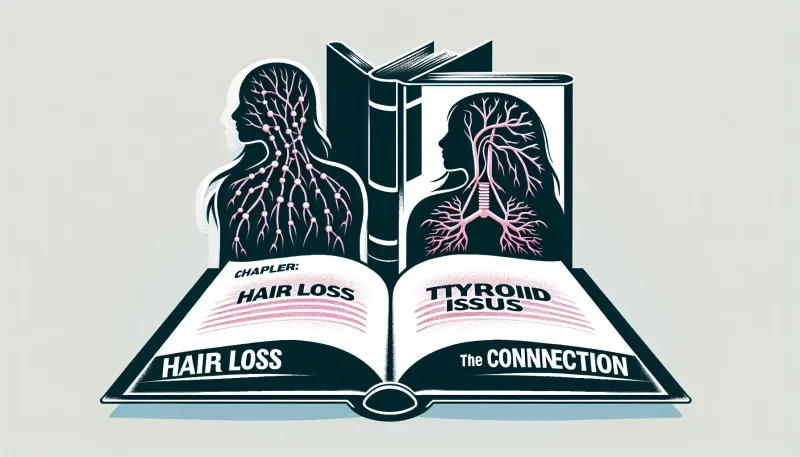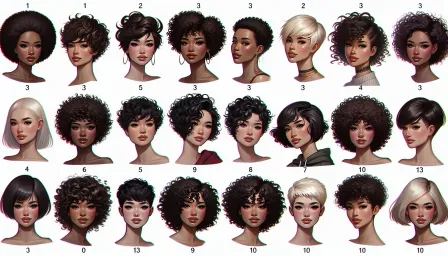The Connection Between Hair Loss and Thyroid Issues: What You Need to Know

Discover the link between hair loss and thyroid issues. Learn about symptoms, causes, diagnosis, and treatments for this condition.
Hair loss can be distressing and significantly impact one's self-esteem. Understanding the underlying causes is crucial for effective treatment. One common yet often overlooked cause is thyroid issues. This article explores the connection between hair loss and thyroid issues, offering valuable insights into symptoms, causes, diagnosis, and treatments.
Understanding Thyroid Issues
The thyroid gland, located in the neck, plays a vital role in regulating metabolism, growth, and development. It produces hormones such as thyroxine (T4) and triiodothyronine (T3), which influence various bodily functions. Thyroid issues arise when the gland either produces too much (hyperthyroidism) or too little (hypothyroidism) of these hormones.
The Link Between Thyroid Issues and Hair Loss
Thyroid hormones directly affect hair follicle health. Imbalances can disrupt the hair growth cycle, leading to hair thinning and loss. Both hyperthyroidism and hypothyroidism can cause hair loss, albeit in different ways. Excessive thyroid hormone can lead to hair shedding, while insufficient hormone levels can slow down hair growth. The good news is that addressing the thyroid issue can often reverse hair loss.
Symptoms of Thyroid-Related Hair Loss
Recognizing the signs of thyroid-related hair loss is essential for early diagnosis and treatment. Common symptoms include:
General Symptoms of Thyroid Issues
- Fatigue
- Weight changes
- Temperature sensitivity
Specific Symptoms of Hyperthyroidism
- Increased heart rate
- Anxiety
- Unintended weight loss
Specific Symptoms of Hypothyroidism
- Dry skin
- Constipation
- Weight gain
Diagnosing Thyroid Issues
To determine if thyroid issues are causing hair loss, a healthcare provider may recommend the following tests:
Thyroid Function Tests
- TSH (Thyroid Stimulating Hormone) Test: Measures the level of TSH in the blood. High levels suggest hypothyroidism, while low levels indicate hyperthyroidism.
- T4 and T3 Tests: Assess the levels of thyroid hormones to provide a clearer picture of thyroid health.
Additional Tests
- Antibody Tests: Detect antibodies against thyroid tissue, indicating an autoimmune condition like Hashimoto's thyroiditis or Graves' disease.
- Ultrasound: Provides a visual assessment of the thyroid gland's structure.
Treatment Options for Thyroid-Related Hair Loss
Treating the underlying thyroid issue is crucial for addressing hair loss. Here are common treatment options:
Treating Hyperthyroidism
- Anti-thyroid Medications: Help reduce thyroid hormone production.
- Radioactive Iodine Therapy: Destroys overactive thyroid cells.
- Surgery: Removes part or all of the thyroid gland.
Treating Hypothyroidism
- Thyroid Hormone Replacement Therapy: Involves taking synthetic thyroid hormones to restore normal levels.
Supporting Hair Health
- Diet and Nutrition: A balanced diet rich in vitamins and minerals supports overall hair health.
- Topical Treatments: Minoxidil can stimulate hair growth in some cases.
- Gentle Hair Care: Avoiding harsh treatments and minimizing heat styling can prevent further damage.
Prevention and Long-Term Management
Managing thyroid-related hair loss requires ongoing care and attention. Here are some tips for long-term management:
- Regular Monitoring: Keep up with regular thyroid function tests to ensure hormone levels remain balanced.
- Healthy Lifestyle: Maintain a healthy lifestyle, including regular exercise and a nutritious diet.
- Stress Management: Practice stress-reducing activities like meditation and yoga.
Conclusion
Hair loss and thyroid issues are closely connected, as thyroid hormone imbalances can disrupt the hair growth cycle. Recognizing the signs and seeking appropriate medical evaluation is crucial for diagnosis and treatment. By addressing the root cause and adopting supportive measures for hair health, individuals can effectively manage and mitigate thyroid-related hair loss.



























